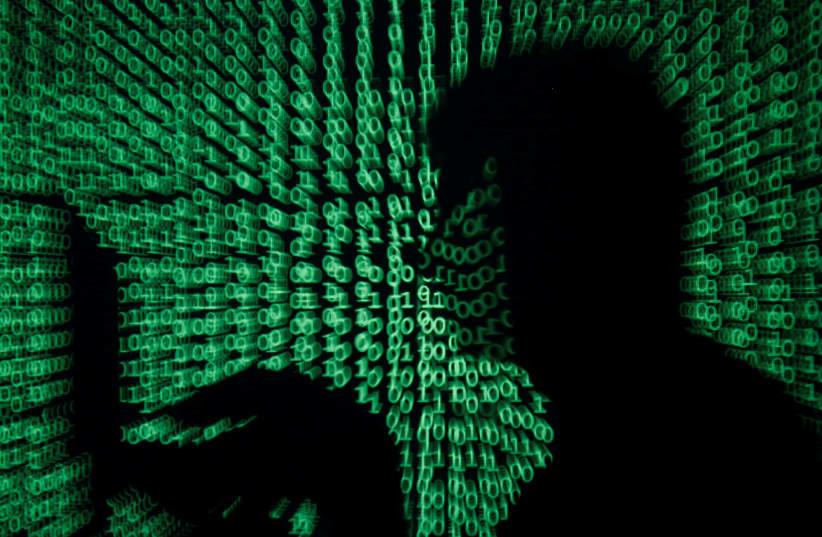Concern over privacy and mass surveillance skyrocketed on Saturday after Prime Minister Benjamin Netanyahu announced that Israel will employ advanced digital monitoring tools used for counterterrorism activities to track individuals diagnosed with the deadly coronavirus.
Calling COVID-19 an “invisible enemy,” Netanyahu said all means would be used to fight the spread of the virus, including technological and digital means that “up until today I avoided using these measures in the civilian population but there is no choice.”
Shortly after the announcement, Attorney-General Avichai Mandelblit approved the use of cyber tools to track sick individuals, releasing a statement saying he’s placed a “variety of restrictions” on the measures, “mostly in terms of the duration of their operation, the legal oversight of their operation, and the use of the information that is collected.”
Meanwhile, the Shin Bet (Israel Security Agency) denied rumors that the cellphone monitoring and other measures would be used to enforce quarantine, rather the agency was considering using them as part of the national effort to prevent the spread of the pandemic.
“It should be emphasized that the intention is not to use said capabilities for the enforcement or monitoring of people currently in isolation,” the agency said.
The announcement was made as part of a new set of restrictions to combat the spread of the fast-spreading and deadly virus. The tracking technology and other measures are used by the Shin Bet against Palestinians in the West Bank in counterterrorism operations, but have never been used to monitor Israeli civilians.
Defense Minister Naftali Bennett on Sunday said that while Israel currently has 213 coronavirus patients, there could be thousands in the next few weeks.
“I think it’s important to tell the public the truth. The truth is we just don’t know how many infected patients there are,” he said. “This coming week is critical because we will know whether we are stabilizing or continuing to increase.”
Israel has spent millions of shekels in technological upgrades, including facial recognition technology, in the fight against Palestinian terrorism. The defense establishment has credited the biometric technologies and various other tools in stopping a large amount of lone-wolf terror attacks against Israelis in the West Bank.
According to a report in Haaretz, Netanyahu referred to the use of cellular geo-localization to verify that individuals diagnosed with COVID-19 haven’t violated quarantine orders, and if they did then to follow their path and identify people they may have crossed paths with. By Sunday evening, the paper reported that officials were currently leaning toward using such technology to only send messages with quarantine instructions to people who suspect they have the virus.
Former Shin Bet head Yaakov Peri told The Jerusalem Post that while the use of such measures was an “undemocratic tool, we are in a strange world...in an emergency situation and this is one of the means which can be used to protect the civilian population.”
Peri, who headed the agency from 1988 to 1994, explained that while the technology would likely be used on the cellphones of those who are infected “in order not to spread the virus,” the Shin Bet would likely not be used to enforce quarantine and “act like a force against terrorism.”
And despite the linear growth of those found to be infected with the virus, the use of the invasive technologies will unlikely be pervasive and focus solely on those infected “in order to make sure the virus doesn’t spread,” explained Peri, who headed the agency from 1988-1994.
Former Shin Bet officer Lior Ackerman told the Post that the agency has “outstanding technological capabilities” that allow them to locate suspicious activity against state security and identify suspects in such activity.”
The Shin Bet he said, will not use the technologies to track or locate patients but rather “It is about using existing mapping technologies to enable identification of areas or people staying in infected places and get them checked out as soon as possible. In no case is this an activity that is illegal or outside the authority of the organization.”
According to the former senior officer, several countries including South Korea, Taiwan, Singapore and China have been able to stem the spread of the virus using such technologies.
Ackerman stressed that there is “no danger of invasion of privacy and the fear of breach of public rights is not real” because all activities carried out by the agency are done under very strict rules and under the guidance of the attorney-general.
On Friday Defense Minister Naftali Bennett held a series of meetings to discuss preparations for a possible state of emergency and ordered the defense establishment to immediately set up three group recovery facilities for individuals diagnosed with the novel coronavirus.
Until then, those diagnosed with the virus are being treated at home while in a mandatory 14-day quarantine. Several of those diagnosed have been arrested by authorities for violating that self-isolation order, including one man whose arrest in central Tel Aviv on Saturday night was caught on film. According to the police, 52 people have gone against quarantine orders.
“We are in the most dramatic of days,” Bennett said on Sunday. “I prefer to violate the rights of the individual in a controlled way and under significant civil control measures - to save lives.”
Nevertheless, according to Peri, the population follows orders “and if there are some measures which need to be taken, it will be against individuals and not large masses of the population. But “if people leave their phones at home, they won’t be able to be tracked,” he warned.
“I know that there are some people in Israel who are against Big Brother, but I’m not concerned… It’s an invasion of privacy and I hope that once we get over this terrible epidemic, we will stop using it.”
